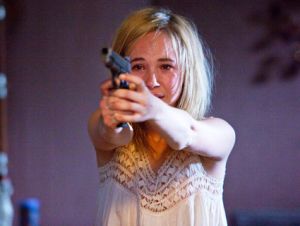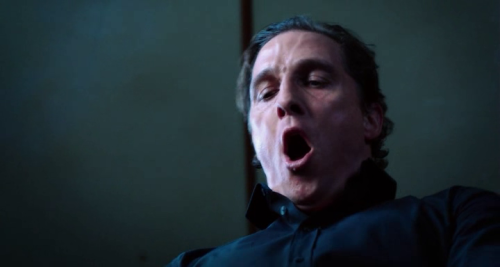You may never look at your K-Fry-C quite the same again. The strange, salacious fate of a chicken leg in Killer Joe is but the sharpest note in a kind of white trash opera written by Tracy Letts, based on his 1993 play of the same name. The lurid proceedings are directed with grim energy (and little else) by veteran William Friedkin.
Killer Joe will be referred to elsewhere as a Southern Gothic. But let us not demean the many dark, bold and original works of art that properly fall under that heading by associating it with the clumsily lurid film at hand. Such ventures, southern gothic stories, are often strange and not without intervals of sharp violence, but usually there's a point, some truth around which the weirdness revolves. Ultimately, Killer Joe has no more to say about trailer parks, hired killers, or socio-economics than it does about the proper use of fried chicken. And despite Mr. Letts' Oklahoma origins and the story's Texas setting, Killer Joe is about as believably southern as Emile Hirsch's half-hearted Texas drawl.

Mr. Hirsch plays Chris Smith, a less-than-successful drug dealer. Whatever his attempts at vocation might be, it quickly becomes apparent that poor Chris can't do anything right. As Killer Joe begins, he can't even gain entry to his home, which sits in a trailer park being lashed with an almost Biblical display of lightning and rain. The rain eventually subsides, but this is a place of perpetual muddy ground outside the trailer in which all manner of tacky debris seems planted for good, where a pit bull strains against its chain nearby, barking incessantly. But inside at least there's a nice flat screen t.v and cable hook-up. This is still America, after all. After lots of banging, calling inside for someone to let him in and occasional shouts to tell T-Bone (the pit bull) to shut up, the door is finally opened for Chris. Standing in the doorway is his step-mother, Sharla. This Gina Gershon, making one of the...ahem, bushier entrances in film history. But compared to what will follow for the double-dealing Sharla, standing in the doorway of a trailer without benefit of skirt, jeans or even underwear is a moment of relative dignity.
 |
| Um...McDonald's, anyone? |
A meeting with Killer Joe is arranged and occurs in a conveniently empty pool hall. He states his terms - $25,000 in cash, in advance, no exceptions. Chris explains that the price is not a problem so much as that pesky in advance stipulation. They had planned to pay Joe from the proceeds of the life insurance policy. Just as Joe is about to say goodbye to these losers forever, he stops in the doorway of the pool hall, arrested by the sight of the winsome Dottie twirling around in the middle of the street. Joe and Dottie have already met by this point, at the family trailer where the meeting with Chris and Ansel was supposed to occur. Dottie clearly made a strong impression. Joe rethinks his iron clad terms and says that he might be willing to take on the job if Dottie can serve as his retainer. "Hey man, you talkin' about my sister?" asks Chris, conviction already wavering. "Is that who she is?" responds Joe, with a rather forceful rhetorical question. The matter is settled.
Joe's sudden willingness compromise might seem slightly surprising. But whether twirling in rather ethereal fashion in the middle of that small town Texas street, kung-fu kicking to a movie on t.v. (when she's first seen by Joe), or starring in the erotic dreams of her brother, Dottie is a rather singular young woman. So unusual is Killer Joe's sister/daughter/human retainer that a student at Louisiana State University has written a masters thesis on the character. But tellingly, it's a thesis in acting, not writing. Dottie might present a rich challenge for any young actress, but the highly sexualized waif - at one moment naive and the next stone cold practical - is the sort of character that tends to be the exclusive product of the febrile imagination of a horny men. Juno Temple does better with this unseemly jumble of male fantasy than one might expect.
With a clueless father and son conspiring to have their ex-wife and mother offed for insurance money by a lunatic police detective who moonlights as a hired killer, all the while pimping out the daughter/sister to the killer and trying to contend with the rogue present wife who seems to have an agenda of her own...well, what could possibly go wrong? Everything, of course. Even the dinner of fast food chicken. Surely, there are more sinister things cooked up in trailer parks (or board rooms; a movie and a story for another day) than this. And there have been more than a few men in the history of law enforcement paid to serve and protect whose schemes for extra money run rather counter to that mission. But Killer Joe simply mines its white trash milieu for some convenient caricatures and throws them into an outlandish story that offers cheap thrills and little more.
Director William Friedkin has gotten some credit for the dire momentum, if not outright energy of Killer Joe. As if we should congratulate the old guy for being able to pilot the roaring, tacky muscle car that is the film. Neither Mr. Friedkin nor screenwriter Tracy Letts bring any kind of original approach to the setting or material, just a misplaced, almost gleeful commitment to see it through. There's virtually no style demonstrated by Friedkin. At times, there's even something less than competence, as when Chris is chased down by a couple of Digger Soame's biker collection agents. The beating meted out to Chris is one of the least believable you're likely to see this side of a no budget student film. The makeup job which follows, broad bands of purple on the face of Emile Hirsch, does little to recover the illusion of a face beaten. Instead, it's as if he's been pummelled not with fists or feet, but with planks or manhole covers. Or just a pissed-off makeup artist.
Poor Mr. Letts should be cut some slack for having to start with such dubious source material. That would be his own play, written some fourteen years before he was anointed one of our finest dramatists, with a 2008 Pulitzer Prize for his August: Osage County. I haven't seen "August," but can only assume he had something more to say by the time that he sat down to write it, as compared to Killer Joe. Here there's just a slumming, childish boldness. As with something like Dark City, what passes for daring, for style, is mainly scantily clad or naked women and violence oddly rendered. Something to be expected perhaps from an overheated adolescent boy; rather unseemly when perpetrated by grown men.
The shame of all this, beyond the crimes against deep fried chicken and the loss of 102 minutes of one's life in watching the film, is the wasted performance of Matthew McConaughey. There's always been something quite louche lurking beneath the southern charm. It was mined for laughs and to good effect in Tropic Thunder. With Killer Joe, the darkness beneath the easy going light finds its best and creepiest expression yet.
As with last year's Young Adult and its star Charlize Theron, there is in Killer Joe an attractive Hollywood actor quite willing and able to go where their disturbed characters might take them. In both films, the screenwriter - Diablo Cody in the case of Young Adult - do their best work in writing the often stinging dialog of their main characters. But neither Cody nor Letts are able to place those characters in a context in which they might make sense or have a really significant impact. Neither film is ever believably real or effectively, successfully unreal.
I wonder about a moment during Joe and Dottie's second encounter, their first date, as it were. As she's changing clothes, Joe hears a song on the radio and this sets him off on something of a riff. What we hear is Lee Hazlewood's "These Boots Are Walkin'." But Joe refers to the song as Hazlewood's "Okie From Muskogee." The latter, of course, is one of Merle Haggard's best known tunes. The mention of "Okie" takes Joe's stream of consciousness to Oklahoma and its Red River border with Texas. He tells Dottie that at one time, the border was in the middle of the river, but now it's the south bank. "It's like losing your front porch," he laments. The question is whether it's just a sloppy mistake consistent with a film of cheap outs on the part of Letts and Friedkin. Or is it intentional, a subtle indication of Killer Joe's warped perception? Is it one of those fleeting moments in the film in which McConaughey holds center stage - or at least center trailer living room - and Killer Joe is, to borrow that line from U2s "Love is Blindness," "...a dangerous idea that almost makes sense?"
I also wonder about the K-Fry-C. This apparent bit of cultural shorthand, like the general caricature of trailer trash in Killer Joe, is reminiscent of the Cohen Brothers at their (generally earlier) broad and misanthropic worst. Does anyone actually refer to their chicken as K-Fry-C? Perhaps it would be best to give Letts credit for at least knowledge this potential regionalism. Or maybe its just the result of legal advice, the fear of the real KFC filing suit. It might true that there's no such thing as bad publicity. But chicken leg fellatio is probably not any marketer's idea of good product placement.
 |
| While you're at it Dottie, how about pluggin' the writer and director? Juno Temple in Killer Joe. |
db







Comments
Post a Comment